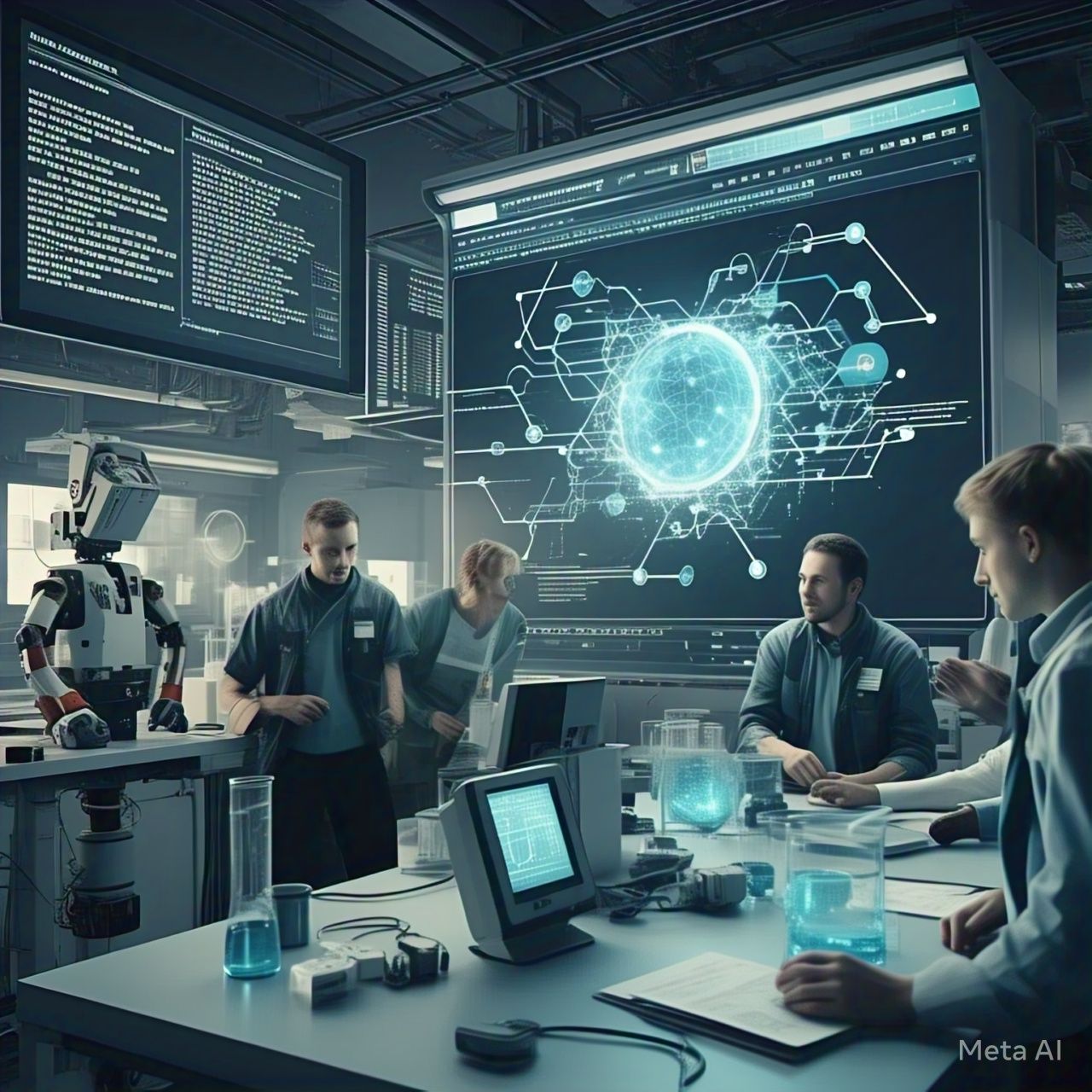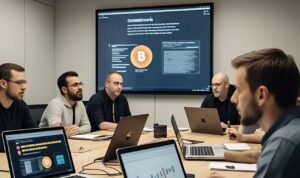INtoday’s rapidly evolving technological landscape, Artificial Intelligence (AI) and Blockchain are two of the most transformative innovations. While AI enhances automation, data analysis, and decision-making, blockchain offers transparency, security, and decentralization. The combination of these two cutting-edge technologies has the potential to revolutionize industries, from finance and healthcare to supply chain management and cybersecurity.
But how do AI and blockchain work together? What are the potential benefits and challenges of integrating these technologies? And what real-world applications are already leveraging this powerful combination?
In this article, we’ll explore:
The fundamentals of AI and blockchain
How these technologies complement each other
Real-world use cases of AI-powered blockchain solutions
Challenges and future possibilities
Let’s dive into the synergy of AI and blockchain and whether they truly make the perfect match.
Understanding AI and Blockchain
What is Artificial Intelligence (AI)?
Artificial Intelligence (AI) is a branch of computer science that enables machines to perform tasks that typically require human intelligence. These include:
Machine Learning (ML): AI systems learn from data and improve over time.
Natural Language Processing (NLP): AI understands and generates human language.
Computer Vision: AI interprets and analyzes images and videos.
Predictive Analytics: AI identifies patterns to forecast future events.
AI is already transforming industries by automating processes, personalizing customer experiences, and optimizing decision-making.
What is Blockchain?
Blockchain is a decentralized digital ledger that securely records transactions across multiple computers, ensuring transparency, security, and immutability. Key features of blockchain include:
Decentralization: No single authority controls the network.
Transparency: All transactions are publicly recorded and verifiable.
Immutability: Once data is recorded, it cannot be altered or deleted.
Security: Cryptographic techniques ensure data integrity and prevent fraud.
Blockchain is widely used in cryptocurrencies, smart contracts, supply chain tracking, and secure digital identity management.
How Do AI and Blockchain Complement Each Other?
While AI and blockchain operate independently, their integration can create synergistic benefits:
| Feature | AI | Blockchain | How They Work Together |
|---|---|---|---|
| Data Processing | Analyzes massive datasets | Securely stores and shares data | AI processes blockchain data for insights and automation |
| Security | Vulnerable to data breaches | Immutable and tamper-proof | Blockchain secures AI models and prevents unauthorized access |
| Transparency | AI decision-making is a “black box” | Provides auditable records | Blockchain enhances AI model explainability |
| Automation | AI enables autonomous decisions | Smart contracts execute transactions | AI-driven smart contracts optimize automation |
By combining these strengths, AI and blockchain can enhance security, efficiency, and decision-making in various industries.
Key Use Cases of AI and Blockchain Integration
1. AI-Driven Smart Contracts
Smart contracts are self-executing agreements stored on a blockchain. While they are automated, they follow predefined conditions and lack flexibility.
🔹 How AI Improves Smart Contracts:
AI can analyze real-time data and trigger contract execution dynamically.
AI-driven smart contracts can adapt to market conditions, legal changes, or anomalies.
Machine learning models can predict fraudulent activities before executing transactions.
✅ Example: A decentralized insurance platform can use AI to assess risk factors before automatically approving claims via smart contracts.
2. Secure and Trustworthy AI Models
AI systems rely on large datasets, which are often stored on centralized servers, making them vulnerable to manipulation or hacking.
🔹 How Blockchain Helps AI Models:
Blockchain verifies and secures AI-generated data, preventing tampering.
AI models trained on blockchain-verified data ensure accuracy and fairness.
Distributed ledger technology (DLT) enhances AI model auditing and accountability.
✅ Example: AI-driven healthcare diagnostics can use blockchain to securely store medical records while ensuring data privacy and compliance.
3. AI-Powered Fraud Detection in Blockchain Networks
Blockchain transactions are secure, but fraud and cyberattacks still occur, such as:
Phishing attacks targeting crypto wallets
Money laundering using decentralized exchanges
Fake transactions in blockchain-based supply chains
🔹 How AI Detects Fraud:
Machine learning algorithms can analyze blockchain transactions and detect suspicious patterns.
AI-powered fraud detection tools can flag anomalies in real-time before fraudulent transactions are finalized.
Predictive AI models can help prevent crypto exchange hacks by identifying potential security breaches.
✅ Example: AI-driven Anti-Money Laundering (AML) solutions can monitor cryptocurrency transactions and flag illicit activities.
4. Decentralized AI Marketplaces
AI development is currently dominated by tech giants like Google, Microsoft, and Amazon. A decentralized approach could make AI models more accessible and fair.
🔹 How Blockchain Enables Decentralized AI:
Blockchain can create open AI marketplaces, where users can buy and sell AI models securely.
AI algorithms can be tokenized as NFTs, ensuring ownership and intellectual property protection.
Users can contribute data for AI training and receive cryptocurrency rewards.
✅ Example: Projects like SingularityNET allow developers to share and monetize AI models in a decentralized ecosystem.
5. AI-Enhanced Supply Chain Management
Supply chains often suffer from lack of transparency, fraud, and inefficiencies. Blockchain can record supply chain transactions, while AI can optimize logistics and predictive analytics.
🔹 How AI and Blockchain Improve Supply Chains:
AI-powered algorithms predict demand fluctuations and inventory needs.
Blockchain ensures transparent tracking of goods from origin to destination.
AI-powered sensors and IoT devices monitor real-time product conditions (temperature, humidity, etc.).
✅ Example: IBM Food Trust combines AI and blockchain to track food supply chains, reducing waste and improving safety.
Challenges of AI and Blockchain Integration
While AI and blockchain hold great promise together, there are challenges to overcome:
❌ Scalability Issues: Blockchain networks can be slow, making real-time AI processing difficult.
❌ Data Privacy Concerns: AI requires massive amounts of data, but blockchain’s transparency could expose sensitive information.
❌ Computational Costs: AI and blockchain both require high processing power, leading to expensive infrastructure.
❌ Regulatory Uncertainty: Governments are still developing regulations around AI ethics and blockchain governance.
Solving these challenges requires advancements in blockchain scalability (e.g., Layer 2 solutions) and privacy-preserving AI techniques (e.g., federated learning).
The Future of AI and Blockchain
As AI and blockchain continue to evolve, new innovations will emerge, such as:
🚀 AI-Generated NFTs: AI can create unique digital artwork stored securely on the blockchain.
🚀 Self-Learning Smart Contracts: AI-powered contracts can adapt and improve over time.
🚀 Blockchain-Based AI Governance: Decentralized networks can ensure ethical AI development.
🚀 Autonomous AI Agents: AI bots could manage crypto portfolios and execute trades based on blockchain data.
Are AI and Blockchain the Perfect Match?
While AI and blockchain have challenges to overcome, their integration presents endless possibilities. By combining AI’s intelligence with blockchain’s security, we can create more transparent, efficient, and decentralized digital ecosystems.
The question isn’t if AI and blockchain will merge—it’s when and how.
Conclusion
AI and blockchain complement each other in ways that can transform industries. From smart contracts and fraud detection to decentralized AI marketplaces, these technologies offer groundbreaking solutions to modern challenges.
As businesses and developers explore new ways to integrate AI and blockchain, we’re moving toward a future of trustworthy, intelligent, and decentralized systems.
🔹 Do you think AI and blockchain are the perfect match? Let us know in the comments!







